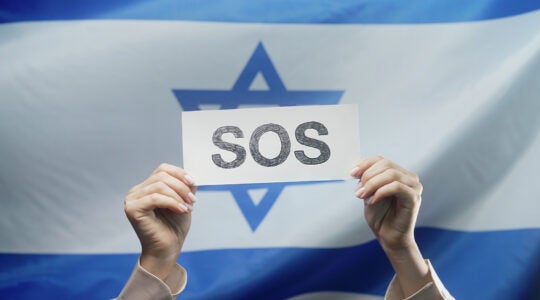NEW YORK (JTA) — In David Grossman’s 2008 novel “To the End of the Land,” an Israeli mother flees to the countryside to avoid news of her soldier son, who is serving a dangerous stint in the West Bank. Ora considers herself apolitical and tries to avoid talking or thinking about the Israeli-Palestinian conflict.
“And yet politics chases her and crushes her,” Grossman told an interviewer. “Politics is like acid here. No matter how many protective coatings you put on yourself, it eats through them.”
Politics chased Grossman to New York this week, where an adaptation of his novel by two of Israel’s best-known theater companies — the Habima National Theatre and the Cameri Theatre of Tel Aviv — was staged Monday night as part of the Lincoln Center Festival. Last week, a group of more than 60 artists called on Lincoln Center to cancel the play because one of its backers was Israel’s Office of Cultural Affairs.
The protest’s organizer, Adalah-NY, accused Lincoln Center of “helping the Israeli government to implement its systematic ‘Brand Israel’ strategy of employing arts and culture to divert attention from the state’s decades of violent colonization.”
The ironies abounded, and seemed to be lost on the kinds of artists who usually promote complexity in — and, as Jordan Hoffman noted in The Times of Israel, government funding of — the arts. Grossman is not only the best-known Israeli novelist of his generation, he is one of its leading leftists as well. For years, much of what the West knew of the “real anguish of the Palestinian people” — Grossman’s words — came through his nonfiction works like “The Yellow Wind.”
“To the End of the Land” is a play about Israeli anguish, not Palestinian, but you’d have to be a dunce not to realize that its anti-war message is implicitly about the need to solve the conflict in order to keep boys and girls on both sides from dying.
The petition drew a handful of biggish names, including playwright Caryl Churchill, an old anti-Israel hand; director Andre Gregory; and actor Greta Gerwig. But if they expected street protesters, they never materialized: The play went off without a hitch, and the sizable police contingent outside the Gerald W Lynch Theater had little to do other than direct the sold-out audience to the box office. The mostly gray-haired theater-goers were patted down and sent through metal detectors (more ironies!), and no one rushed the stage or cried “shame” from the balcony.
To be fair, and I don’t know why I need to be, the petition targeted the government’s sponsorship of the play, not its content. Israel, as governments are wont to do, promotes its brand abroad using the arts and culture. This makes Lincoln Center, according to the petition, complicit in promoting Israel as a “progressive center of the arts and culture.”
The protest also noted that Israel’s minister of culture, Miri Regev, would attend the play and thereby “underline the importance the hardline Israeli government places on its Lincoln Center partnership.” Maybe, but Israel’s cultural elite also resent Regev because she doesn’t want the government to sponsor theater or artists who undermine the country’s values and symbols as she sees them. Last year, she initiated an amendment that would give her the authority to suspend funding for cultural activities that “contravene the principles of the state.”
So, in one sense, you can say the protesters and their target deserve each other — or at least agree, weirdly, that government funding for the arts is inherently political and problematic.
But then you watch the play, or look around the audience, and you realize how misguided the protesters are. There was Regev and Dani Dayan, the former settler leader who now serves as consul general in New York. There was Grossman, whose own son was killed in Lebanon shortly before “To the End of the Land” was published. I sat behind New Yorker editor David Remnick, who has written both lovingly and deeply critically of Israel, publishing fiction and nonfiction that has angered both the right and the left.
What the protesters don’t get — and what Regev realizes — is that Israel’s cultural sector is the most reliable critic of the policies they abhor. If they silence these critics, it’s another victory for the Israeli right. If you want to hear criticism of Israel, look no further than your typical Jewish film festival: The Israeli entries, often with government funding, are invariably heavy with examinations of the occupation and its toll on both Jews and Palestinians.
The protesters aren’t just one-sided in putting all the responsibility for the conflict on Israel, they are myopic in how they view the Israeli body politic. Making Israel a pariah state won’t bring the Palestinians any closer to achieving freedom and self-determination, but it will turn Israelis even more insular and uncompromising.
As Grossman himself has written,”I believe that Israel still contains a critical mass of people, both left-wing and right-wing, religious and secular, Jews and Arabs, who are capable of uniting — with sobriety, with no illusions — around a few points of agreement to resolve the conflict with our neighbors.”
Instead of discouraging works like “To the End of the Land” from being seen abroad, protesters might encourage the kind of cultural and political debate they incite and the critical mass they might inspire. It’s crazy that you would need to remind artists of this.
(“To the End of the Land” runs for three more performances, July 25, 26, and 27.)
JTA has documented Jewish history in real-time for over a century. Keep our journalism strong by joining us in supporting independent, award-winning reporting.







